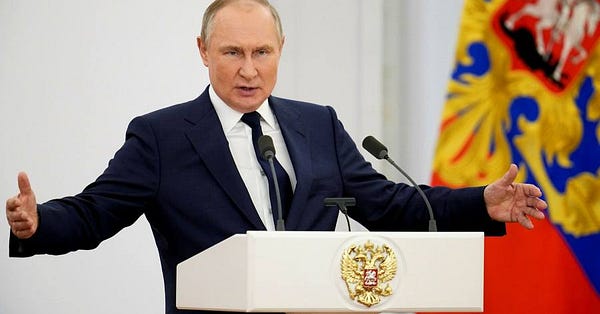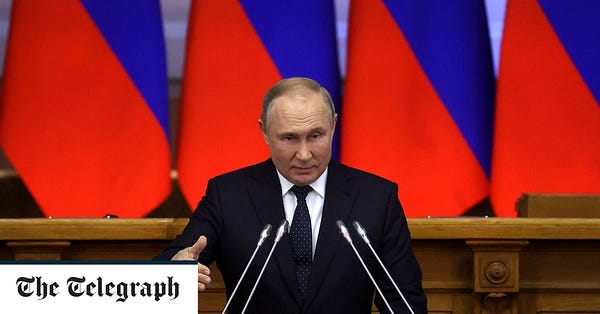Reigning in the Fear
Why we should not worry about escalation in Ukraine
In the last few days, a significant amount of reporting and analysis has warned of the risks of nuclear escalation if the U.S. continues to assist Ukraine in its fight to repel Russian aggression. This discourse has focused on two primary sources of evidence:
First, it has analyzed Russian rhetoric that equates the war in Ukraine to an existential crisis, rhetoric implying that the survival of the Russian state is at stake. These analyses suggest that if Russia perceives the danger in that capacity, then the state has incentives to escalate.
Second, these analyses contend that Russian state media and certain legislative leaders speak for Putin, that what the media/political leadership says is what Putin thinks. Thus, these analysts suggest Western powers should take Russian state media statements seriously and amend policy to avoid the risk of escalation with a nuclear power.
This thread by Mike Mazarr is a good example:

This has led some, like Tom Nichols, to speculate about the risks if Putin is actually insane:


[To be fair to Nichols, he supports staying the course in Ukraine. His thread is solely about understanding the risks.]
And here is where I want to intervene:
Putin is not a madman. He is not insane. And he does not think this is a war for the survival of Russia.
First, Putin miscalculated. He expected Ukraine to fold. That doesn’t make him insane. It makes him…typical. Dictators tend to miscalculate because their information systems operate in a corrupt system of patronage that encourages making the leader happy rather than clear eyed assessments.
Second, miscalculation is not unique to dictators or Putin. Need I remind you, dear reader, of George W. Bush’s expectation that Iraqis would great the U.S. “liberators” with open hearts and embrace democracy? Was George Bush insane?
Every time someone says “Putin is insane because he invaded Ukraine,” a devil gets its horns. Because it takes a special kind of ideological blinders to ignore the clear parallel.
Third, Putin isn’t a madmen because he is telling us, with his own words, that he is not a madman. This is the part that is driving me crazy. Putin literally gave a speech yesterday that points to his “sanity” and yet the media is rife with paranoia about the risk of nuclear confrontation:


In the immortal words of Ricky Bobby, “Dear Lord baby Jesus, lyin' there in your ghost manger, just lookin' at your Baby Einstein developmental videos, learnin' 'bout shapes and colors,” take the wheel. This not the most dangerous period since the 1962 Cuban missile crisis. There were war games held in 1983 that almost sparked a nuclear war!
But beyond that, Putin’s speech at a meeting with the Council of Lawmakers yesterday, April 27th, suggests we are no where close to crisis. I will offer up three quotes to make the case:
Putin narrows the scope of the mission:
“All the goals of the special military operation launched on February 24 will definitely be attained in order to guarantee peace and security for the residents of the Donetsk and Lugansk people's republics, of Russian Crimea, and our entire country in a historical perspective.”
Notice the definitional shift. I previously wrote about Russia’s stated war goals of “denazification” and “demilitarization.” Both of those have disappeared from Putin’s rhetoric. Indeed, the expansive goals have now been restricted, on the fly to just the Donetsk and Lugansk. Putin’s limited framing clarifies that this conflict is not an existential crisis. The existence of Russia is not at stake.
Putin specifically claimed the threat to the Russian state has been resolved:
“Our soldiers and officers have averted a real danger posed to our Motherland. Their courage, determination, and heroism have prevented a larger conflict that would have unfolded on our territory, but following someone else's scenarios.”
Notice the past tense. If there was a “real danger” to the “Motherland,” it no longer exists. Even the fantastical notion about the survival of Russia advanced by Russia’s Fox News has, according to Putin, been resolved.
Putin warns against direct intervention by the West (re: U.S.):
“Let me emphasise once again: if anyone intends to intervene from the outside and create a strategic threat to Russia that is unacceptable to us, they should know that our retaliatory strikes will be lightning-fast. We have the tools we need for this, the likes of which no one else can claim at this point. We will not just brag; we will use them if necessary. And I want everyone to know this; we have made all the decisions on this matter.”
This is the one that scares the analysts. Is Putin threatening the West with nuclear attack? Well, no, not really. Rather, this is a fairly run of the mill nuclear signal, a signal he’s sent several times since February. He’s threatening retaliation. He’s threatening a response. A response to what? Well, we know it doesn’t refer to arms shipments because those have been ongoing. Rather, it warns against direct intervention - no fly zones or more. Shockingly, President Biden has declared the U.S. will not directly intervene in the conflict.
Western media and analysts should stop taking their cues from Russian state TV and instead focus more closely on Putin’s words. State TV, as we saw with Fox News during the Trump regime, doesn’t represent a president’s calculations. It’s hyperbole. It’s outrageous. It gets your attention. But it doesn’t reflect what Putin thinks. The only access to Putin’s mind we have is his words. I know that for some, accepting words (discourse) as a signal challenges how they think about foreign policy analysis. But it’s a vital window into how states think about international problems.
This is not to suggest we ignore Russian State TV. In fact, I’m interested in seeing if their messages change after Putin’s latest speech. Was one of his true audiences State TV? Will Russia’s Tucker Carlson continue to mouth off about nuclear war? Or will they now shift to a narrative of victory in preparation for Russian Victory Day celebrations on May 9th?
Propaganda is networked. It serves multiple purposes and audiences. Recycling facile tropes about nuclear war might generate clicks and follows, but it’s not analysis.


